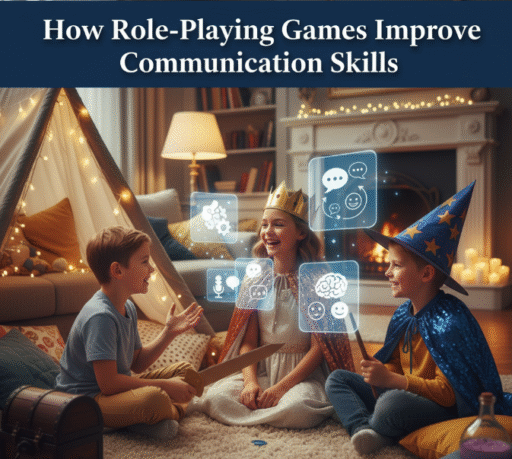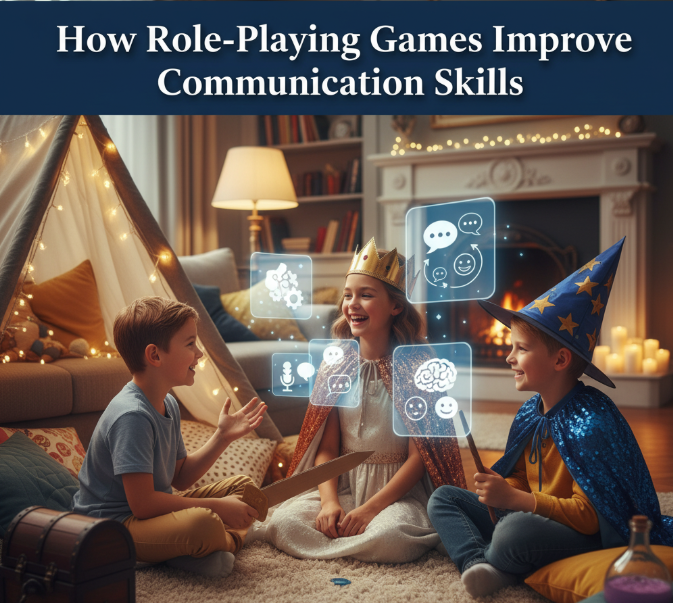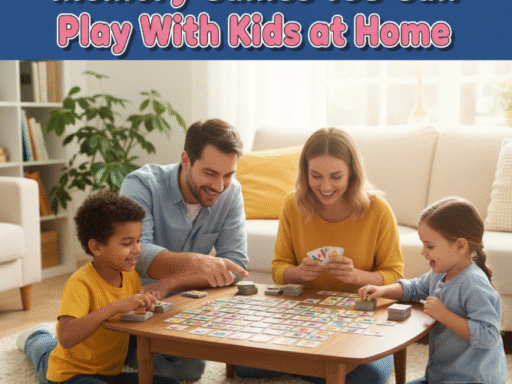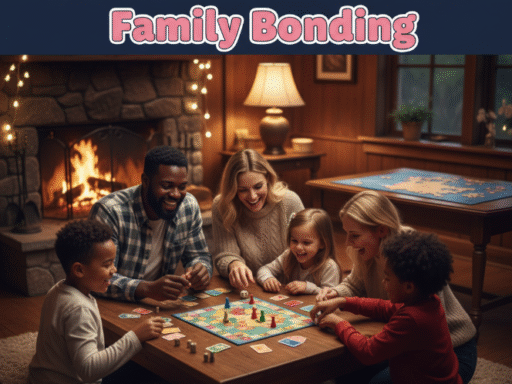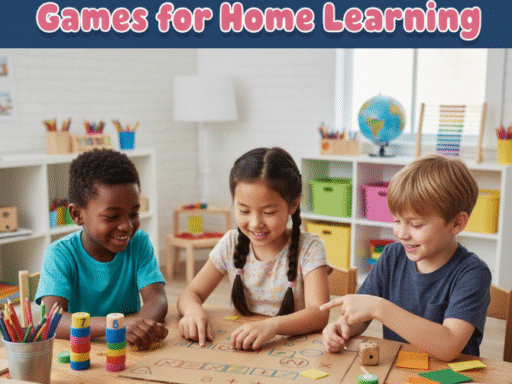Introduction
Communication is one of the most valuable skills we can develop in life. Whether it’s talking with friends, expressing ideas at school, or working on group projects, the ability to clearly share thoughts and listen to others is essential. Surprisingly, one of the most fun ways to practice communication is through role-playing games (RPGs).
These games—whether tabletop adventures like Dungeons & Dragons, story-driven video games, or classroom role-play activities—immerse players in situations where they must work together, solve problems, and make decisions as a team. Along the way, players naturally sharpen their ability to speak, listen, negotiate, and express themselves creatively.
In this article, we’ll explore in detail how role-playing games improve communication skills. We’ll look at different types of RPGs, the specific skills they develop, and why they’re so powerful for people of all ages.
What Are Role-Playing Games?
At their core, role-playing games allow players to take on the role of a character in a fictional world. Instead of being passive observers, participants actively shape the story by making choices and interacting with other characters.
Main Types of Role-Playing Games
-
Tabletop RPGs (TTRPGs) – Games like Dungeons & Dragons involve dice, character sheets, and storytelling around a table. Players describe actions, while a “Game Master” guides the world.
-
Video Game RPGs – Digital games such as Skyrim, Final Fantasy, or The Witcher let players explore massive worlds, complete quests, and interact with non-player characters (NPCs).
-
LARP (Live-Action Role-Playing) – Players physically act out their characters’ actions, often in costume, creating an immersive storytelling experience.
-
Classroom or Training Role-Play – Used in schools and workplaces to practice real-life scenarios such as job interviews, negotiations, or conflict resolution.
All of these formats share one important element: they require players to communicate—both with their team and within the story.
The Connection Between RPGs and Communication
When playing a role, participants must constantly talk, explain, and negotiate. Unlike solo activities, RPGs rely on teamwork and interaction. This builds communication skills naturally, without the pressure of formal training.
Here’s why RPGs are particularly effective:
-
They encourage active participation instead of passive learning.
-
They require collaboration—no player can succeed alone.
-
They reward creativity, pushing players to express themselves clearly.
-
They provide a safe space to practice without real-world consequences.
Specific Communication Skills Enhanced by Role-Playing Games
1. Active Listening
In RPGs, missing important details can mean losing a battle or misunderstanding a quest. Players quickly learn to focus on others’ words, listen carefully, and respond appropriately.
Example:
-
In Dungeons & Dragons, a player might say, “The door has a trap on it.” If teammates don’t listen, they could trigger the trap and harm their characters.
2. Public Speaking Confidence
Many players are shy at first, but as they describe their character’s actions, they practice speaking in front of others. Over time, they gain confidence expressing ideas clearly.
3. Vocabulary and Expression
RPGs often involve creative descriptions, persuasive dialogue, or negotiations. This helps players expand their vocabulary and learn new ways to express themselves.
4. Team Collaboration
To succeed, teams must share ideas, delegate tasks, and support each other. This mirrors real-world teamwork in classrooms, workplaces, and families.
5. Empathy and Perspective-Taking
By stepping into the shoes of a character, players experience life from another point of view. This teaches empathy and helps them understand how different people communicate.
Table: RPGs and the Communication Skills They Build
| Type of RPG | Main Communication Skills Developed | Real-Life Benefit |
|---|---|---|
| Tabletop RPGs (D&D) | Active listening, storytelling, group discussion | Better teamwork and class participation |
| Video Game RPGs | Decision-making dialogue, reading comprehension | Stronger problem-solving and literacy |
| Live-Action Role-Play (LARP) | Public speaking, non-verbal communication | Improved presentation and body language |
| Classroom/Training Role-Play | Negotiation, empathy, conflict resolution | Success in job interviews and social situations |
Why Role-Playing Games Are More Effective Than Traditional Learning
Traditional communication lessons can sometimes feel forced or boring. In contrast, role-playing games provide:
-
Engagement: Players are motivated by fun and adventure.
-
Realistic practice: They mimic real conversations in a safe environment.
-
Instant feedback: Other players react immediately, helping participants adjust their communication style.
-
Low pressure: Mistakes don’t carry real-world consequences, making players more willing to take risks.
Real-Life Scenarios Where RPG Communication Skills Help
-
Classroom Discussions – Students who play RPGs often feel more comfortable raising their hands, sharing opinions, and debating respectfully.
-
Workplace Teamwork – RPG players are used to collaboration, making them effective in group projects or meetings.
-
Conflict Resolution – Negotiating with a game villain or another player teaches calm problem-solving, which transfers to real-life disputes.
-
Public Speaking – The confidence gained from role-play storytelling helps players in speeches, presentations, or interviews.
-
Leadership Development – Many games require someone to step up and guide the group, building natural leadership and communication.
How Parents and Teachers Can Use RPGs for Communication Development
For Parents:
-
Encourage family game nights with tabletop RPGs.
-
Let kids play age-appropriate RPG video games and ask them to explain their decisions afterward.
-
Join them in role-play scenarios (e.g., pretending to be shopkeepers, adventurers, or detectives).
For Teachers:
-
Use role-playing activities to simulate debates, historical events, or real-world scenarios.
-
Assign group storytelling projects where students create characters and act out scenes.
-
Incorporate “choose-your-own-adventure” style classroom RPGs.
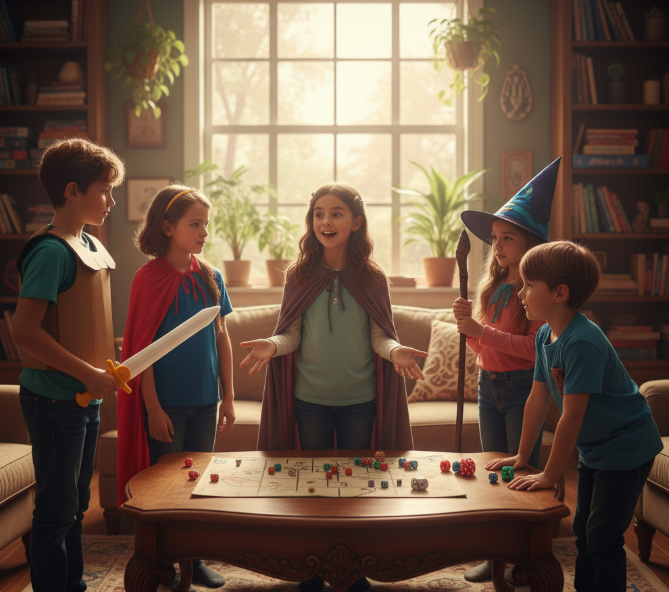
How Role-Playing Games Improve Communication Skills
A Step-by-Step Guide to Using RPGs to Improve Communication
-
Choose the Right Game – Pick one suited to the age and comfort level of the players.
-
Encourage Participation – Ensure every player gets a chance to speak.
-
Focus on Storytelling – Ask players to describe actions in detail.
-
Promote Teamwork – Set goals that require group cooperation.
-
Reflect Afterwards – After the game, discuss what communication strategies worked best.
Infographic Idea (textual description for you to design later)
Title: How RPGs Boost Communication Skills
-
Icons for listening, speaking, teamwork, empathy
-
Arrows showing “Game Scenario → Skill Learned → Real-Life Benefit”
-
Example: Negotiating with a wizard → Persuasive speaking → Better debate performance
Common Misconceptions About RPGs
-
“They’re just games.” – In reality, RPGs are interactive learning tools.
-
“They waste time.” – Skills developed during play transfer directly to school, work, and relationships.
-
“Only extroverts enjoy them.” – RPGs are excellent for introverts, helping them practice communication in a safe space.
-
“Video RPGs don’t count.” – Many digital RPGs require strategic dialogue and decision-making, which also build communication skills.
Long-Term Benefits of Communication Learned Through RPGs
-
Stronger relationships and friendships
-
Better performance in group projects
-
Higher confidence in job interviews and career growth
-
Enhanced leadership ability
-
Improved emotional intelligence and empathy
Conclusion
Role-playing games are more than just entertainment. They are powerful tools for building essential communication skills that last a lifetime. By encouraging players to listen, speak, collaborate, and empathize, RPGs create an environment where learning feels natural and fun.
Whether through tabletop adventures, video game quests, or classroom role-play exercises, RPGs help players practice the art of communication in ways traditional lessons often can’t. For students, parents, and educators looking for an engaging way to strengthen these vital skills, role-playing games offer an adventure that goes far beyond the game board.
